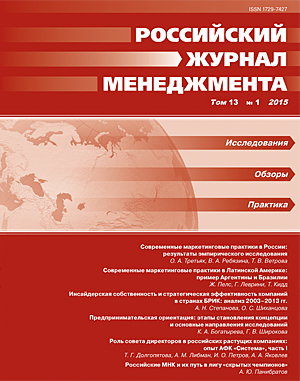The Role of a Board of Directors In Russian Growing Companies:
A Case of Joint Stock Financial Corporation “Sistema”, Part I
Abstract
The research is based on the case-study of joint stock company “Sistema” which is a large Russian public company controlled by its founder. The study includes in-depth interviewing of the members of the Board of directors and members of the executive body of the company, the analysis of its internal documents and reports, and other pieces of open information. The existing literature suggests that companies with concentrated ownership, even if they decide to recruit high-profile individuals as directors, rarely involve the boards in decision making. Two articles were prepared based on this case-study. The first one presented in this issue describes business development and management of the corporation. We revealed that AFK “Sistema” has evolved from conglomerate to the investment company gradually. Since 2010th its business model has been transformed from operational holding company to investment one. The second article in the next issue of RMJ will present the evidence how the transition to new business model accompanied by the significant changes in the composition and the powers of the Board of directors.
Keywords:
board of directors, business model, stock ownership concentration, resource-based view, firm evolution
Downloads
References
The List of References in Cyrillic Transliterated into Latin Alphabet
Downloads
Published
How to Cite
Issue
Section
License
Articles of the Russian Management Journal are open access distributed under the terms of the License Agreement with Saint Petersburg State University, which permits to the authors unrestricted distribution and self-archiving free of charge.





